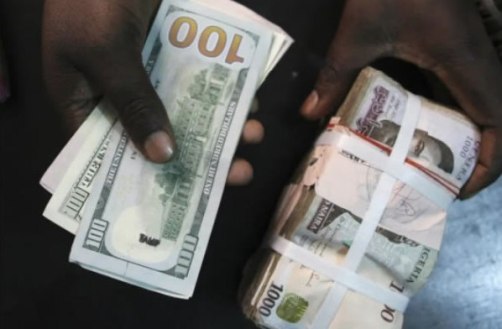
Martins Hile, Editor, Financial Nigeria magazine
Follow Martins Hile
![]() @martinshile
@martinshile
Subjects of Interest
- Governance
- SMEs
- Social Development
Why Buhari hasn’t made naira equal in value to the dollar 10 Feb 2021

From left: US dollar and Nigerian naira notes
Muhammadu Buhari’s ambitious vision for the economic transformation of Nigeria caused him, as a presidential candidate of the All Progressives Congress (APC) in 2015, to pledge he would bring the value of the naira at par with the United States dollar if voted into office. As President, he has never stopped working to achieve this vision and other critical agenda like security for all Nigerians.
President Buhari has always believed that a strong naira can only be underpinned by fiscal discipline and anti-inflationary monetary policies. But People's Democratic Party (PDP) administrations grossly mismanaged the economy in the 16 years they were in power. Together with their cronies, they squandered over $500 billion of oil earnings.
The rapacious corruption in the country saddened Muhammadu Buhari in 2015. As he mused about the state of the economy, he rightly figured the downward spiral in the value of the local currency didn’t speak well for the country; indeed, it was hurting the people. Of course, the wailing wailers said Buhari was simply raising a false hope.
Following his inauguration, the President tactically rejected calls to devalue the naira, notwithstanding the oil price plunge of mid-2014 to early 2016. He travelled around the world and worked hard to stabilise the oil market.
Devaluing the naira was a recipe for higher inflation and increased economic suffering for ordinary Nigerians. This would undermine our administration's agenda to increase economic opportunities. Instead, the President helped the Central Bank of Nigeria (CBN) in defending the naira and sanitising the foreign exchange market that had been riddled with corruption. Using a mishmash of strategies, the CBN did well to introduce controls to stem the unbridled demand for dollars that was putting pressure on the naira.
President Buhari's efforts to work with the CBN to stop access to FX for food and other imports does not amount to executive interference with the independence of the CBN as some idle people on social media have suggested. It’s not unusual for central banks all over the world to receive their policy instructions from the government elected by the people.
But on the counsel of his top economic advisers, the President agreed to ending the dollar peg, effectively depreciating the naira. With this, the Federal Government achieved a number of goals, including making Nigerian exports more competitive, discouraging food imports that constitute a drain on foreign reserves and promoting economic diversification through import substitution.
By blocking food imports, domestic food production will increase, non-oil export will improve, and the economy will grow. Moreover, inflation – predominantly affected by rising food prices – will reduce. Easing the cost of production is part of the commitments of the President Buhari administration to improving the business environment. Sadly, some unscrupulous elements in the polity have falsely claimed this government is antitrade even after we signed the African Continental Free Trade Area (AfCFTA) agreement.
As expected in a managed-floating ex-change rate regime, the CBN continues to intervene regularly in the forex market, including by providing strategic windows to facilitate FX liquidity. But low oil prices and high FX demand sometimes affect the liquidity. This isn’t unusual. But the usual wailers keep wailing about multiple ex-change rates and saying the CBN’s strategy is inefficient and prone to corruption.
But they forget President Buhari is anti-corruption personified and will not countenance corruption in the system. For instance, any bank or individual found to be involved in round-tripping will face the full wrath of the law. The Nigerian economy can’t support a situation where people are exploiting the system to widen the premium between the official and parallel market rates.
Those making false and scurrilous claims that some people connected to the Presidency engage in forex arbitrage should tread very carefully. Our commitment to fighting corruption shouldn’t be impugned. In any case, President Buhari is immune to such broadsides against his administration’s world-class economic reforms, which will raise the value of the naira in the long run.
Last year, the CBN allowed the official rate to weaken closer to the market rate. This will minimise arbitrage opportunity and enable government's dollar earnings to be converted to naira at a higher rate to increase naira revenues. We are certain our policies will eventually unify the value of naira and dollar.
The value of the local currency will be boosted by strong economic fundamentals, including lower inflation. We are investing in an innovation-driven, productive non-oil export-oriented economy that will lift 100 million Nigerians out of poverty.
Latest Blogs By Martins Hile
- Social outcomes as the tail that wags climate action
- Lessons for Nigeria's climate finance strategy
- Rethinking Nigeria's development for people-centred outcomes
- Nigeria's economic prospects in a changing world order
- Naira commoditisation as CBN's cashless policy flaw






